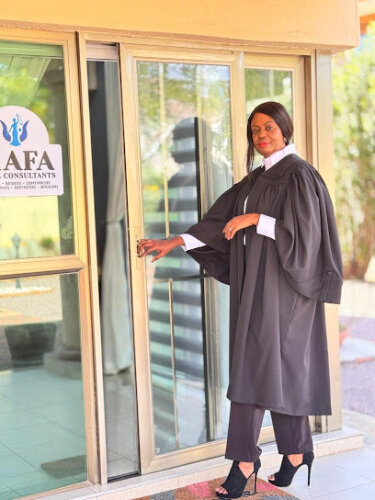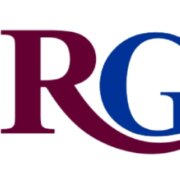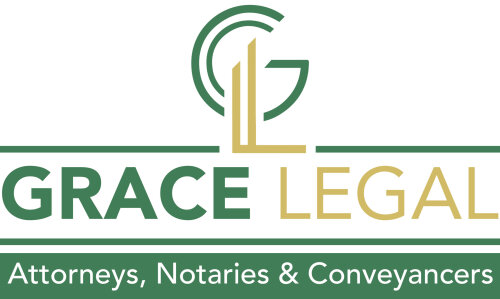Best Natural Resources Lawyers in Gaborone
Share your needs with us, get contacted by law firms.
Free. Takes 2 min.
List of the best lawyers in Gaborone, Botswana
About Natural Resources Law in Gaborone, Botswana
Natural Resources law in Gaborone, Botswana, encompasses regulations and legislation governing the use, management, and preservation of the country's natural resources. These include minerals, water, wildlife, and forests. Botswana is renowned for its substantial diamond reserves, which contribute significantly to the economy, making the regulation of natural resources crucial. Other critical resources are wildlife tourism, with national parks and game reserves playing a major role. Gaborone, being the capital, is the central hub for governmental and legal institutions involved in the management of these resources.
Why You May Need a Lawyer
Individuals and businesses may require legal assistance in matters relating to natural resources for various reasons. Common situations include:
- Resource Licensing: Navigating the complexities of obtaining licenses for oil, gas, mining, or water usage.
- Environmental Compliance: Ensuring activities comply with local environmental laws and regulations.
- Disputes and Litigation: Resolving conflicts over land use, resource ownership, or environmental harm.
- Negotiations and Contracts: Drafting and negotiating contracts related to resource extraction or usage rights.
- Conservation Efforts: Legal advice for organizations involved in conservation and sustainable management projects.
Local Laws Overview
Botswana's legal framework related to natural resources includes several key legislative components:
- Mines and Minerals Act: Governs the prospecting and mining of minerals, with licensing by the Ministry of Mineral Resources, Green Technology and Energy Security.
- Environmental Assessment Act: Requires impact assessments for projects to ensure environmental protection.
- Wildlife Conservation and National Parks Act: Protects wildlife and regulates conservation efforts.
- Water Act: Governs the use and management of water resources, crucial for a landlocked country with limited water supply.
Frequently Asked Questions
1. What permits are required for mining operations in Botswana?
To engage in mining activities, you need to obtain a Prospecting License (PL) and potentially a Mining License (ML), as regulated by the Mines and Minerals Act.
2. How are environmental protections enforced in Botswana?
The Environmental Assessment Act mandates impact assessments for projects likely to have significant environmental effects.
3. Can foreigners own land and resources in Botswana?
While foreigners can lease land, ownership of land and resources is heavily regulated, often requiring partnerships with Botswana citizens or companies.
4. What is the role of the Botswana Ministry of Environment?
The Ministry oversees policies for environmental protection, pollution prevention, and sustainable resource management.
5. How are water rights allocated?
Water rights follow a permit and licensing system governed by the Water Act, prioritizing equitable and sustainable use.
6. What legal challenges might arise from tourism ventures in protected areas?
Potential issues include land use conflicts, environmental compliance with conservation laws, and ensuring sustainable practices.
7. Are there incentives for renewable energy projects?
Yes, Botswana encourages investment in renewable energy, often providing tax incentives and support for sustainable projects.
8. How are disputes over resource ownership handled?
Disputes are typically resolved through negotiation, arbitration, or litigation, with courts involved if necessary.
9. What is required for environmental compliance in agricultural projects?
Agricultural projects may require environmental assessments and adherence to regulations concerning land use and water conservation.
10. Can community-based organizations participate in resource management?
CBOs are encouraged to partake in conservation efforts and can enter partnerships with government bodies to manage community-based projects sustainably.
Additional Resources
For further assistance, consider reaching out to the following organizations:
- Department of Mines: Provides information on mining licenses and operations.
- Environmental Assessment Agency: Offers guidelines and support on conducting environmental assessments.
- Water Utilities Corporation: Manages water resources and distribution.
- Botswana Wildlife Conservation: Focuses on conserving biodiversity and supporting sustainable tourism initiatives.
Next Steps
If you need legal assistance in the field of natural resources, consider the following steps:
- Consult a Lawyer: Seek experienced legal counsel specializing in natural resources or environmental law in Gaborone.
- Research and Prepare: Understand the specific legal requirements for your situation by reviewing relevant laws and regulations.
- Contact Relevant Authorities: Engage with governmental bodies for guidance on necessary permits or regulations.
- Explore Mediation: If facing a dispute, consider mediation as a potentially less contentious path to resolution.
- Join a Professional Network: Engage with local business chambers or networks for industry-specific advice and support.
Lawzana helps you find the best lawyers and law firms in Gaborone through a curated and pre-screened list of qualified legal professionals. Our platform offers rankings and detailed profiles of attorneys and law firms, allowing you to compare based on practice areas, including Natural Resources, experience, and client feedback.
Each profile includes a description of the firm's areas of practice, client reviews, team members and partners, year of establishment, spoken languages, office locations, contact information, social media presence, and any published articles or resources. Most firms on our platform speak English and are experienced in both local and international legal matters.
Get a quote from top-rated law firms in Gaborone, Botswana — quickly, securely, and without unnecessary hassle.
Disclaimer:
The information provided on this page is for general informational purposes only and does not constitute legal advice. While we strive to ensure the accuracy and relevance of the content, legal information may change over time, and interpretations of the law can vary. You should always consult with a qualified legal professional for advice specific to your situation.
We disclaim all liability for actions taken or not taken based on the content of this page. If you believe any information is incorrect or outdated, please contact us, and we will review and update it where appropriate.

















